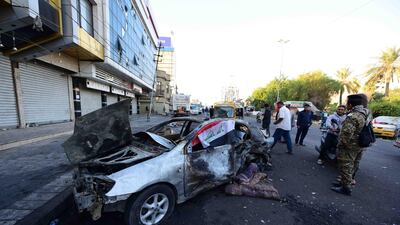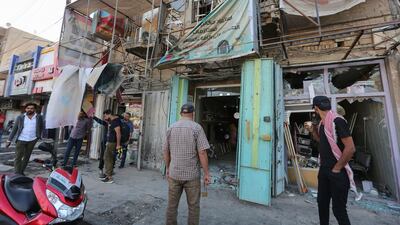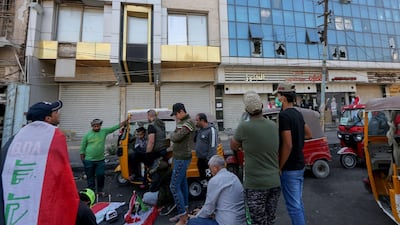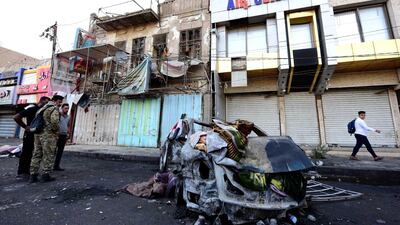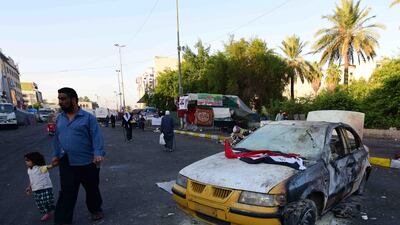At least two people were killed and 12 wounded when a bomb planted underneath a tuk-tuk in Baghdad’s Tahrir Square exploded late on Friday night.
It was the first such attack against anti-government protesters in the Iraqi capital, scores of whom have been killed by live ammunition and military-grade tear gas canisters fired by the security forces.
Witnesses said the explosion set fire to a neighbouring car in the square.
“It was a tuk-tuk and a car [that caught fire], but it was the tuk-tuk that exploded not the car. I was next to the car,” said Rami Jabbar, whose face was scorched by the explosion.
Protesters quickly surrounded the charred wreckage of the vehicles. The force of the explosion flung parts of the red tuk-tuk high up on to electricity cables metres away from the twisted body of the vehicle.
“It was horrific honestly, but despite that, we will stay. There’s nothing else we can do, it’s for the fate of the martyrs,” said Mr Jabbar.
Demonstrations in Baghdad and southern Iraq have been met with violence from security forces since they broke out at the beginning of October. More than 320 people have been killed and thousands have been injured. More recently, protesters have faced a campaign of arrests, threats and kidnappings.
While Tahrir Square has been the centre of the protests Baghdad, confrontations with security forces generally take place on the edges at Sinak bridge and Khilani Square. Those areas have become a moving frontline between protesters and security forces where the air is thick with tear gas and the sound of shots.
On Sunday, protesters seized back part of the Sinak bridge and occupied a tall building overlooking it along with the strategic Khilani Square.
Security forces kept control over part of the Sinak Bridge and erected new concrete barriers to block protesters from pushing into the Green Zone, which houses Parliament and many foreign embassies.
It comes as another activist involved in the protest movement was shot dead on Saturday.
In contrast, Tahrir Square has become a place of relative calm, a miniature tent city where protesters can rest, eat and tend to their wounds. Many stay there for days at a time. The bomb went off next to the garden at the centre of the square, shattering the illusion of safety.
“The goal of the explosion was to scare people, but we will stay here until we have freedom,” said Mr Jabbar.
Mohamed Fadhel, a civil activist at the scene of the blast, believed the target of the bombing was chosen deliberately. “The tuk-tuk is the symbol of the revolution,” he said, “So they want to destroy that image.”
The small three-wheeled vehicles, previously confined to Baghdad’s poorest neighborhoods, have become celebrated for the heroism of their drivers in darting to the frontlines of clashes to rescue the wounded.
At the scene of the explosion, protesters lit small candles on the twisted metal of the tuk-tuk and car in memory of those killed. Others got down on their hands and knees to gather what was left of the victims using lights from their phones, trying to preserve what they could for burial.
“This is from the participants in the protests,” said Adel, an older man in a medical coat who held the gathered remains in a plastic container. “They were young Iraqis carrying only the Iraqi flag and this is their end. We will stay. They can’t make us leave. The people are one, they cannot make us retreat.”
“We all have the right,” said Adel, “The parties have failed; they ruled us for 16 years and all they’ve brought us is corruption, destruction and death. So we must change this government. The will of the people is stronger than the government.”
Sitting amid the crowd and chaos after the blast was a young man with his head in his hands. “The tuk-tuk driver was my friend,” he murmured. “He was martyred. His name was Yassin.”
